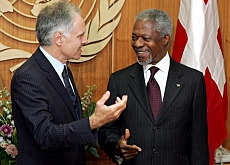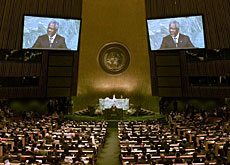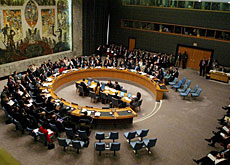Leuenberger sets out Swiss role in the UN

Swiss President Moritz Leuenberger has paid homage to the United Nations for embodying hopes for global justice and solidarity.
Speaking at the opening of the 61st General Assembly, he said no country could solve the world’s current challenges alone and only by working together was there a chance of overcoming problems such as war, terrorism, drugs or environmental catastrophes.
Leuenberger painted his vision of a strong UN which involved powerful countries including the United States.
He also highlighted Switzerland’s basic values of democracy, rule of law and social equality, and how the UN could apply them when tackling conflicts.
“Nation states, and also the UN, must protect people who are being victimised. They must also create and implement a legal system and discover the root causes of conflicts in order to stop the spiral of violence,” he said.
Leuenberger stressed that if the UN failed in its humanitarian role, doubt and the potential for violence would increase. “We can see that in the Middle East and Darfur with brutal clarity.”
He added that the legal system should comprise internationally accepted standards – “the only way right can replace might”.
He described the existence of an international court which deals with international criminal law as a “historic achievement”. “This is a necessity which all countries – including the largest – must take part in.”
Geneva Conventions
Leuenberger underlined that the international community must also combat terrorism – but in doing so it must not turn its back on the rule of law or turn to torture. “The Geneva Conventions are not a hurdle in the fight against terrorism,” he said. “This struggle is only credible if it pays attention to human rights.”
He added that the world must work together against the causes of threats and conflicts – as in the struggle against climate change, in which Switzerland is also involved.
The Swiss president said that ultimately all conflicts – including religious ones – have economic roots. Switzerland and the UN must both work towards the Millennium Development Goals and the reduction of poverty.
Leuenberger also called for dialogue over the situation in Israel, Lebanon and Iraq and the Iranian nuclear programme. He said all sides must avoid fanning the flames.
He defended Swiss neutrality, saying it was an obligation for peace-keeping and in no way legitimised remaining uninvolved.
“International law is the only legitimate ally for neutral parties,” he said. “The point of neutrality is to initiate a peaceful and equitable co-existence between all countries.”
Leuenberger said that was how he saw Switzerland’s neutrality and its role within the UN.
swissinfo, Rita Emch in New York

More
Neutrality
Swiss President Moritz Leuenberger held a series of bilateral talks in New York with UN Secretary General Kofi Annan, and the presidents of Sri Lanka and Montenegro.
He was officially received by Kofi Annan and US President George W. Bush.
He also signed the documents which officially ratify three international agreements, including the Optional Protocol to the Convention on the Rights of the Child.
His visit included a visit to the Swiss Institute where he met the new director, Gianni Jetzer, and artists for an exchange of ideas and points of view.
Kofi Annan, who is ending his second five-year term as UN secretary general in December, gave a speech to the 61st UN General Assembly outlining his vision after ten years at the head of the world body. In his last address to the 192 assembled heads of state, he identified the ongoing dispute between Israel and the Palestinians as the world’s key war zone.
Swiss President Moritz Leuenberger said Annan’s “wonderful speech” had also touched on matters that concerned Switzerland, which should be resolved globally by the whole of the international community.
He added that Annan’s job was one of the toughest in the world, but he still managed to convince people that he really loved his work.
According to the Swiss president, Annan’s tireless devotion to the world body gave it a human face.

In compliance with the JTI standards
More: SWI swissinfo.ch certified by the Journalism Trust Initiative


You can find an overview of ongoing debates with our journalists here. Please join us!
If you want to start a conversation about a topic raised in this article or want to report factual errors, email us at english@swissinfo.ch.